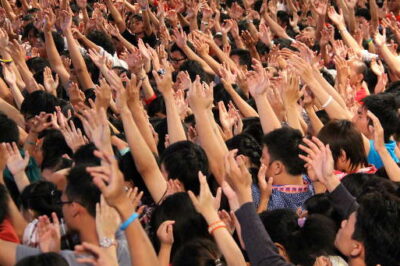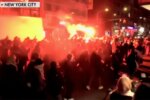Here is a passage in 2 Chronicles that such a clear picture of the heart of God concerning His primary goal concerning “His house.” This has a three-way meaning and application.
The house of God is a picture, type and shadow of the way things should look. The application first begins with our personal lives, as we are the temple of the Holy Spirit.
Next, it has meaning for our corporate gathering together in worship to God. Then there is a reality of how God tangibly and even visibly fills even a physical building, something He still does today!
1. Building the House of God
“Now Solomon wanted to build a temple for the name of the Lord and a royal house for his kingship” (2 Chr. 2:1, MEV).
“I am going to build a temple for the name of the Lord my God, sanctified for Him, for making sacrifices before Him, and for incense of fragrant spices, and for the continual showbread, for burnt offerings on both morning and evening, and for Sabbaths, New Moons, and appointed feasts of the Lord our God, as an ordinance forever for Israel” (2 Chron. 2:4, MEV).
I love this passage because we can clearly see what God’s priorities are. We see Solomon dedicating the house of God for the “name” of the Lord, to the person of who He is. Then we see how this actually works out in the next three elements:
- The Sweet Incense
- The Showbread
- The Offerings
Sweet Incense—Prayer and Worship
“Let my prayer be set forth before You as incense, and the lifting up of my hands as the evening sacrifice” (Ps. 141:2, MEV).
Here in David’s psalm, we see the parallel and picture of how the burning of incense represents the prayers of the saints, that it is to the pleasure of God to see this rising to Him continually. It is also reflected in the book of Revelation where we see a complete connection of life of prayer before the throne of God.
“When He had taken the scroll, the four living creatures and the twenty-four elders fell down before the Lamb, each one having a harp, and golden bowls full of incense, which are the prayers of saints. And they sang a new song, saying: ‘You are worthy to take the scroll, and to open its seals; for You were slain, and have redeemed us to God by Your blood out of every tribe and tongue and people and nation, and have made us kings and priests unto our God; and we shall reign on the earth” (Rev. 5:8-10, MEV).
It is again confirmed here where God says that His house will be called a “house of prayer.” It is worth understanding that it is not a house of evangelism, miracles, preaching and teaching, but a house of prayer. Why? Without God we can do nothing.
Everything that has eternal value is initiated through our intimate communion with God, our relationship and connection with Him. That is why God puts this first. He is for all the other things, but if we are not abiding in the vine through worship and prayer then all the rest will fall to the ground.
As well, I like to make the point that He “makes us joyful” in His house of prayer. In other words, it is not a place of sadness but of gladness. If your prayer life makes you sad and heavy, then something is missing. You may start with a burden for something, if at all, but when you come out of that place ideally you should have abundant joy.
“… even them I will bring to My holy mountain and make them joyful in My house of prayer. Their burnt offerings and their sacrifices shall be accepted on My altar; for My house shall be called a house of prayer for all people” (Is. 56:7, MEV).
Showbread: “The Bread of His Presence”—Presence of God
Next we look at the showbread. This is otherwise known as the “bread of His presence.” Here we see that God’s house is to be a habitation of the presence of God. Solomon dedicates the house of God as a place where the tangible presence of God would dwell.
We are the temples of the Holy Spirit, the presence of God. Again, the showbread was literally bread of the presence. It consisted of 12 loaves of wheat bread, representing the 12 tribes of Israel, placed on the table of the showbread in front of the holy of holies. The showbread did not represent “matzah” but “lechem ha’panim,” that is, “bread of the face.” When we are partaking of the reality of God’s presence, we are experiencing the “face of God.” Here the phrase “face to face” comes alive as we are in the most intimate communion by His Spirit.
Burnt Offerings—Sacrifice
The burnt offering is simply not possible without these previous two elements of prayer and presence because every true sacrifice can only happen by the grace of God being imparted to us as we dwell in His presence.
When Peter said he would be willing to die with Jesus, it was premature because the grace of the Holy Spirit has not been given to empower him at that point. For the sacrifices God calls us to make, we need the grace of God that is released from a life that abides in relationship with Him face to face. It is a sweet savor to God. He enjoys the offering of our lives. It is not given because of sin but because of our devotion.
“Therefore be imitators of God as beloved children. Walk in love, as Christ loved us and gave Himself for us as a fragrant offering and a sacrifice to God” (Eph. 5:1-2, MEV).
Altars of Sacrifice represent:
- Place of Remembrance/Memorial
- A place of atonement for sin
- For us, it is remembrance of the sacrifice of Jesus
- A life is given in sacrifice
- It is completely burned up
2. Established on Mount Moriah
“So Solomon began to build the house of the Lord in Jerusalem on Mount Moriah, where He appeared to David his father, at the place that David established on the threshing floor of Ornan the Jebusite” (2 Chr. 3:1, MEV).
Mount Moriah is the place where Solomon’s temple was built, meaning “chosen by the Lord.” It represents a place of obedience, encounter and provision, as it was the same place of Abraham’s giving of Isaac, where the Lord provided the sacrifice. It is also the place where David purchased the threshing floor of Ornan to intercede into order to stay the plague God had released upon Israel for David’s personal disobedience. As well, it is the place of the current Temple Mount in Jerusalem. Here we see the story of David.
“David said to Gad, “I am very distressed. Let us fall by the hand of the Lord, for His mercy is great. May I not fall by the hand of man” (2 Sam. 24:14, MEV).
God Gives David a Choice:
• Seven years of famine
• Flee three months before your enemies
• Three days of plague
David, knowing the mercy and goodness of God, wisely chooses to fall into His hands rather than the other options. The prophet Gad advises David to buy the threshing floor of Ornan. A threshing floor is where they separate the chaff from the wheat that is usable. This location represents purity of heart, obedience to God and true sacrifice as we see in this passage below. David refuses to offer to the Lord something that costs him nothing.
“Araunah said, ‘Why has my lord the king come to his servant?’ David replied, ‘To purchase the threshing floor from you in order to build an altar to the Lord, so that the plague may be averted from the people.’ … However, the king said to Araunah, ‘No, for I will certainly purchase from you for a fair price. I will not offer up to the Lord burnt offerings that cost me nothing.’ So David purchased the threshing floor and the oxen for fifty shekels of silver.” (2 Sam. 24:21,24, MEV).
3. The House Finished
“When Solomon had finished building the house of the Lord and the king’s house and all else he desired, the Lord appeared to Solomon a second time, as He had appeared to him at Gibeon. The Lord said to him, ‘I have heard your prayer and supplication, which you made before Me. I have consecrated this house which you built by putting My name there forever. And My eyes and My heart shall be there perpetually.'” (1 Kings 9:1-3, MEV).
When the house of God is finished, we see how God honors the heart of Solomon saying:
1. I heard your prayers.
2. I consecrated or “set apart” this house.
3. I built it for My name eternally.
4. My eyes and heart will be there.
God wants our lives to be filled with the incense of worship and prayer. Many times we find “worship” and “prayer” is the same word in the Hebrew as they are very interconnected with each other. As set-apart lives for His glory, God marks us with His name upon our foreheads, saying that His “eyes and heart” will be there perpetually.
What an amazing promise!
I love the corporate aspect of worship and prayer as well. There are some things we can do in our personal devotion that are needed, but there are also things that we can do together as one that we cannot do apart. We are together a habitation of the Lord, His building that is not built with stones but of hearts consecrated to Him.
Give God your whole heart today in worship, devotion, prayer and sacrifice, allowing Him to establish a habitation of His presence within you. {eoa}
John Belt helps people discover abundant life in God’s Presence through intimacy and breakthrough. He is co-founder, along with his wife Brandi, of Overflow Global Ministries and travels itinerantly through speaking and worship in the U.S. and abroad. John has produced over 30 instrumental and worship albums that create an atmosphere for encounters with heaven and can be found around the world in places such as Bethel Redding, 24/7 Burns, Catch the Fire Toronto, XPMedia, International Houses of Prayer and people’s living rooms. He the author of Overflowing in His Presence, to be released later this year.
For the original article, visit overflowglobal.com.







Leave a Comment
You must be logged in to post a comment.